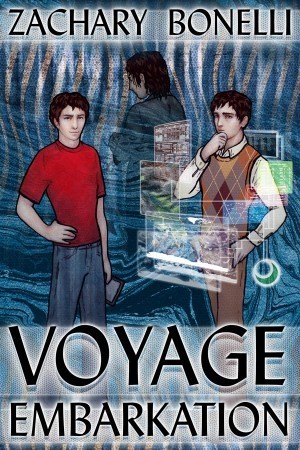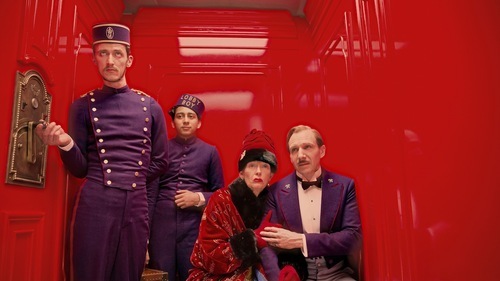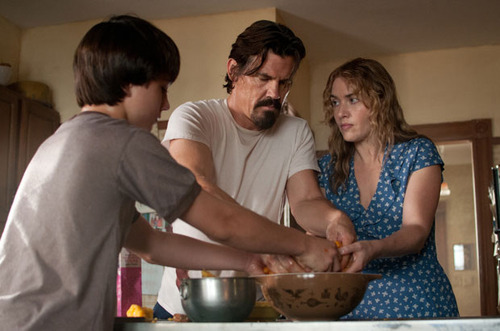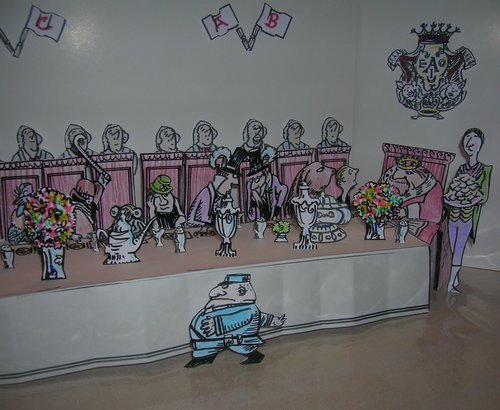Adam Hutchinson's Blog
February 3, 2015
Are you ready?
This blog is about to make a comeback. Contain your excitement. And stay tuned.
March 27, 2014
A Lonely Boy

“A lonely boy exploring shadows. It must be beautiful.”
I just finished the first book in the Voyage series by Zachary Bonelli, and I might have a new favorite protagonist. Kal Anders is nerdy, sensitive, and determined to help others more than himself, and refreshingly, the fact that Kal is gay plays little into the plot of the story, besides the occasional lingering glance at an attractive boy. Kal’s main character idiosyncrasies come from his isolation, spending his teenage years away from his family and friends, all alone on a strange planet.
On his quest, Kal might be searching for a way to return home to Earth, but what he’s really finding along the way is a redefined sense of belonging. In each world that he visits, Kal encounters social structures that he can mimic, maybe even embrace, but he has seen too much, experienced too much to fully integrate himself into a new life. Often, Kal is too smart and too caring for his own good and ends up making trouble for himself and, unfortunately, for others.
Kal’s sexuality comes into full play when he goes to college in the second-to-last chapter, on the world Irth. Though more institutionalized, the homophobia of this world is strikingly similar to our own, a world in which the social dogma against homosexuality is as ridiculous as antiquated customs like “No eating squash on alternating Wednesdays and Fridays,” but homophobia is prevalent nonetheless.
Most gay protagonists of fantasy and sci-fi literature struggle with their sexuality through the plot of their stories, while their adventures and quests are the common ground with their straight character counterparts. In Voyage: Embarkation, Zachary Bonelli rejects this standard and inverts the metaphor. Kal’s sexuality is commonplace, while his metaxic adventures are what make him ‘abnormal.’ I wanted to hug him, kiss him, and cry for him, all at the same time. Now I HAVE to read the next book.
“Everywhere I go,” Kal began softly, “I have to explain to people how I’m different, and I have to figure out how to navigate rules I don’t understand.”
http://www.fuzzyhedgehogpress.com/speculative-fiction/voyage/embarkation/
The Royal Garden

(This picture is from the Tuileries Garden in Paris)
I’m in the middle of a new writing project right now, but I’ve been re-reading through my novel lately for inspiration. I had almost forgotten about this little passage:
Timothy purchased a ticket back to the Interchange, but as he held it in his hand, the words ‘one-way’ jumped out at him. Instead of heading over to the D Platform, Timothy turned to the elevators, not quite sure where he was going but sure enough that he wasn’t ready to leave. Off to one side of the bank of elevators, a large, framed directory listed what could be found on each of the floors. He scanned the list for something, anything, to buy himself some time, and then he noticed floors ninety-four and ninety-five were labeled as the Royal Garden. How could a garden grow in the middle of a skyscraper?
Although the glass elevator rose quickly, with the amount of people getting on and off at various floors, it took several minutes to reach the top of the building. By the time they passed the ninetieth floor, the elevator was higher than all the surrounding buildings and Timothy, who was normally fine with heights, had to turn away from the glass. One of the last two passengers inside, he rushed off as soon as the doors opened on the ninety-fourth floor.
The garden grew by artificial ultraviolet lights in the ceiling, and Timothy noticed a sprinkler system that probably watered it at night. It was a quiet, restful place, with several benches placed picturesquely under trees and a gravel walking path through beds of flowers and herbs. All along the outer edge of the floor, stone statues of people in robes stood in little alcoves of the hedges, and on one side, a spiral bronze staircase led up to the second story. In the exact center of the garden, there was a circular pool of water on which wooden, toy boats were sailing gently from one side to the other. On one of the benches around the pool sat the only other people in the park besides Timothy: a man taking a nap and a woman reading The Petrified Media. Their young son paced around the pool, pushing the boats away from the edge with a stick, so they could continue sailing across the ripples of the water.
Timothy sat on a bench on the other side. He was in love with this strange Kingdom of Flabbergast. He wished he could live on the twenty-ninth floor of a building like the Venn family, ride monorails filed with people, and most of all, be able to explore the city on his own. James and Nancy had no idea how lucky they were.
The woman on the other side of the pond folded up her newspaper, woke her husband, and called after her son. He pushed one final boat into the water and ran after his parents. They left by the elevator.
From his pocket, Timothy took out and unfolded the flyer that Harold had given to him in the Ministry’s office. The Ministry, motwots, the Interchange, all secrets his parents had kept from him. They had never trusted him, but Timothy wished he could say, “Look how far I’ve come now. I found the Interchange, I traveled to Flabbergast, I made it to the City of Avalon, all by myself.”
March 24, 2014
Kal
I’ll write a more detailed post once I finish the book, but you have no idea how refreshing it is to read a book with a gay character where the plot ISN’T about his sexuality.
Voyage: Embarkation by Zachary Bonelli
Also, I think we should all wear sashes to denote our sexualities. Would be a lot easier to pick up boys.
March 15, 2014
"I'm Afraid That's Me, Darling."

Ralph Fiennes’ character, Monsieur Gustave, in The Grand Budapest Hotel is Wes Anderson’s best creation to date.
He is layered with dimensions. Not only does he go off on poetic and philosophical musings, but he also cuts them short with an “oh, fuck it” and a shot of whiskey. He is nostalgic, not for a former world, but for a world entirely of his own creation. Flamboyant, gay (bi?), selfless and selfish, with just enough naivety to remain funny without trying too hard.
He’s also a character that can work across setting, from the hotel, to a train, to a jail, to a monastery, making him the perfect protagonist for an adventure story. And make no mistake, this is a classic Wes Anderson adventure story, but it also explores new territory for Anderson.
Where a normal Anderson film would end, he takes it into a black-and-white scene sequence. The audience knows what has to happen in the story but never expected Wes Anderson to be the one to take them there. The mere character of M. Gustave keeps the coherence between the familiar and the strange.
SPOILER: The best (but also worst) part is that, unlike the rest of Anderson’s characters, in all of his films, M. Gustave comes to a tragic end. And the film is left in heartbreak, for both nostalgia and injustice.
February 26, 2014
Poetry Repurposed

(from the Levi’s “Go Forth” commercial, featuring Walt Whitman’s “America”)
Although wit, catchphrases, and humor are still staples of TV commercials, a new trend is emerging: the use of famous poems read as voice-overs to pathos-invoking ads. These commercials feature poems that would be…
February 1, 2014
JKR confirms: Harry & Hermione More Than Fanfic

I’m not usually one to condone authors trying to influence their novels’ interpretations after publication, but this is one time when I’m glad she spoke up.
JK Rowling has revealed in an interview with Emma Watson that Hermione should have ended up with Harry, not Ron. This is something I have always believed and part of why the last book disappointed me. Rowling said that she originally thought Hermione and Ron would develop a relationship in the series, and she put them together just to fulfill her personal first conception of the series.
I don’t blame her, but I’m glad she has recognized the mistake. I do not think this should ruin the series for anyone. It just goes to show that characters are people, and sometimes they act in ways we can’t predict.
To read the article, visit: http://www.hypable.com/2014/02/01/jk-rowling-ron-hermione-relationship-regret-interview/
January 26, 2014
Labor Day

"They were like the two Apollo astronauts who moved together along the surface of the moon, while their trusty companion stayed behind in the space capsule, monitoring the controls and making sure things were all right”
I just finished reading Labor Day by Joyce Maynard (the picture above is a film still of the movie based on the book). While it wasn’t the best written novel in the world, there were some scenes just too beautiful to not love.
How poignantly sex played a role in the development of the novel was so interesting. The narrator Henry is a twelve-year-old boy (no explanation necessary), but more importantly, his mother is a recluse who hasn’t been with someone in several years. Frank, the escaped convict whom they take into their home, is a starkly public person. Thus, just as Henry is beginning to feel sexual attraction, he consistently overhears his mother having sex with Frank in the next room, which is something of a sexual re-awakening for herself. Needless to say, when Henry finally has the opportunity for his own sexual exploration with a girl from his school, he is unable to perform an act which, for him, has taken on connotations of danger and secrecy.
What’s even more perfect (or rather, perfectly devastating) is that his refusal to have sex with her has catastrophic results for the rest of the novel. Without giving too much away, I’ll just say that I admire Maynard for being able to equate sex with trust, submission, desire, and love all at once.
On another note, the movie is from one of my favorite directors, Jason Reitman, and everyone should go see it.
January 24, 2014
The Weight of Words

"You smell of decayed syllables." -Norton Juster, The Phantom Tollbooth
Author and poet Gertrude Stein believed that words have a very real, tangible weight and that placing words next to each other would create an emotional response for the reader. Coupling this belief with her love of Picasso’s cubism movement, Stein wrote a series of “cubist” poems, in which random words are placed together to evoke a broader image.
The poems are terrible. But I think her theory of the weight of words holds true nonetheless, and other poets have picked up on this idea.
Tony Hoagland’s poem “Dickhead” describes the weight of a curse word to an adolescent boy and the ability to wield it like a blunt instrument.
In her most recent collection of poetry Now, Now, Jennifer Maier writes several poems about the memory of words, as if they are collectible remnants of a former time.
Even beyond poets, the weight of words has made it into fiction. In the children’s novel The Phantom Tollbooth, Norton Juster depicts a dinner scene in which the words spoken are not only real but edible—or in some cases very inedible.
In contemporary literary fiction, David Wroblewski uses his mute protagonist to describe the shape and feel of words in The Story of Edgar Sawtelle.
As for myself, I find the weight of words to be penetrating, especially when juxtaposed (like Stein would argue) with the weight of others. The word kissing sends awkward flutters through my skin, unless it’s used as Joe Wilkins did in his “Garage Sale Daze Meditations,” in which a girl’s shoes are “kiss-kissing cold cement.” No flutters here. Shivers. The word alone now feels sharp against me, like a cold steel blade. Without a doubt, words have weight.
January 18, 2014
Yesterday I was in Tully’s, and a woman at the table next to me was having a meeting with her...
Yesterday I was in Tully’s, and a woman at the table next to me was having a meeting with her life coach. They talked about her back pains and her astrology reading and her chiropractor and her masseuse and her leg that was one inch longer than the other and how she only rides her bike if she feels like it.
But this was in Tully’s. So the woman was only half as bad as my coffee.
Adam Hutchinson's Blog
- Adam Hutchinson's profile
- 3 followers



